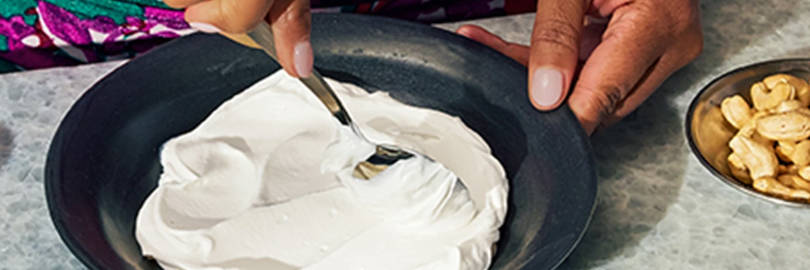
Greek Yogurt vs. Regular Yogurt vs. Cottage Cheese vs. Sour Cream: Differences and Reviews 2025
- It’s an age of great enthusiasm for cultured dairy, with brands updating packaging and recipes to encourage healthy eaters to add it to their diets. So picking healthy snacks at the grocery store can sometimes feel quite daunting. There are thousands of foods to choose from, many touted as beneficial or nutritional. Four of the most common healthy dairy products are: Greek Yogurt, Regular Yogurt, Cottage Cheese, and Sour Cream. They're both full of high-quality nutrients and offer a variety of health benefits, but you might be what sets them apart. This article uncovers the primary differences between these four dairy products to help you decide the right one for you!
What Is Regular Yogurt?
The word yogurt comes from the Turkish yoğurt. Centuries ago it was discovered there that you could also make yogurt from milk – for example from cows. Bacteria play an important role in yogurt making.
Yogurt contains many probiotics, but also important vitamins, minerals and proteins. Yogurt is packed with calcium, proteins and vitamins B12 and B2.
Yogurt is an easily digestible dairy product. People generally tolerate fermented milk products better than unleavened milk. It’s because of the bacteria. During the fermentation they converted the milk sugars (lactose) into probiotics. There is virtually no lactose in yogurt.
What Is Greek Yogurt?
Greek yogurt is a type of Mediterranean dairy product produced by straining yogurt out of milk, then fermenting it into a thicker consistency. The straining process for Greek yogurt infuses it with almost twice the amount of protein contained in regular yogurt, keeping you fuller for longer. Plain Greek yogurt has a more sour taste than regular yogurt due to the fermentation and straining process. This strained yogurt does not contain liquid whey (the leftover remnants after milk is strained).
What Are the Differences Between Greek Yogurt and Regular Yogurt?
Texture – Greek yogurt is made by straining out the extra whey in regular yogurt, which makes the yogurt thicker, creamier and tangier than regular yogurt.
Protein – Greek yogurt has almost double the protein of regular yogurt.
Calcium – Regular yogurt will give you the biggest calcium boost. A cup of regular low-fat plain yogurt supplies 45 percent of the daily value for calcium, while Greek yogurt provides about 20 percent of the DV for the bone-building mineral.
Fat – If you choose nonfat yogurt, you'll find both regular and Greek yogurts with less than 1 gram, as they're made with skim milk. But if you go full fat, regular yogurt has fewer fat grams.
Sodium – Greek yogurt contains about half the sodium of regular yogurt.
Carbohydrates – Greek yogurt contains roughly half the carbohydrates of regular yogurt, but remember that adding sweeteners to either one will increase the carbohydrate count.
Cost – Greek yogurt is usually slightly more expensive than regular yogurt. However, the cost can vary widely, depending on the brand, retailer, and where you live.
Which Yogurt to Choose?
Both Greek and regular plain yogurt have their benefits, so which one you choose depends on your health goals and taste preferences. You may choose the high-protein Greek yogurt to make a more filling and hearty snack. It's also a perfect ingredient for smoothies and complements well with fruit and whole-grain cereals for breakfast.
Regular yogurt, on the other hand, is more affordable and has more calcium per serving. Since regular yogurt has more natural sugars than its Greek counterpart, you may be more inclined to choose this over the Greek variety if you want to satisfy your sweet tooth. Like Greek yogurt, you can also use plain yogurt as a marinade or a garnish for soups, add it to smoothies and use as a substitute for sour cream.
What Is Cottage Cheese?
Cottage cheese is a creamy, soft, white cheese made from pasteurized cow's milk curds, including nonfat, reduced-fat, or regular milk. It's considered a fresh cheese, so it does not undergo an aging or ripening process to develop flavor. As a result, it has a very mild flavor compared with aged cheeses.
It's also offered in different curd sizes, including small, medium, or large, and is available in creamed, whipped, lactose-free, reduced sodium, or sodium-free varieties.
Cottage cheese is frequently enjoyed alone or paired with fresh fruits and vegetables. However, it can also be used instead of ricotta or cream cheese in dips, casseroles, and other recipes.
What Are the Differences Between Cottage Cheese and Yogurt?
Appearance and Taste:
Yogurt is thick, creamy and has a slightly sour taste. This sour taste is a result of the fermentation process.
Cottage cheese is soft and thick. It can be available in coagulated lumps or solid square, cubes or round shape obtained by removing most of the water.
Calories:
If we compare equal quantities of yogurt and cottage cheese, we find that cottage cheese has more calories. So, for the calorie conscious, yogurt is a better choice.
However, if you'd like to reduce your calorie intake without having to forego the benefits of these products, opt for their versions that are made using skimmed or low fat milk.
Carbohydrates:
Yogurt and cottage cheese are both dairy products which are made using milk. Milk, despite its nutrients, is moderately high in carbs.
Yogurt and cottage cheese are thus moderately high in carbs but in comparison, yogurt has more carbs.
Fat:
Traditionally both yogurt and cottage cheese are made using whole milk which usually has around 3.5% fat. This makes yogurt and cottage cheese high in fat content. In comparison to yogurt, cottage cheese has a higher amount of fat.
Protein:
Yogurt and cottage cheese are rich in a variety of nutrients including vitamins, minerals and proteins. However, you can pick cottage cheese instead of yogurt if you increase your protein intake.
Yogurt is low in protein and is not the same as its strained version greek yogurt.
Calcium:
One of the main nutrients that all dairy products have in good quantity is calcium. Yogurt has an advantage of being more calcium-rich.
Sodium Content:
If sodium is a concern, stick to yogurt, especially Greek style. Regular low-fat yogurt averages 172 milligrams of sodium in a cup, Greek yogurt runs about 65 milligrams, and low-fat cottage cheese packs in 746 milligrams per cup.
Probiotics:
Yogurt has one advantage over regular cottage cheese: live cultures. Those helpful bacteria, or probiotics, may help in digestion and in easing symptoms of irritable bowel syndrome. Thanks to its live cultures, you might find yogurt more tolerable than cottage cheese if you suffer from lactose intolerance, or difficulty digesting the sugars in dairy products.
Which Is Better?
Ultimately, both cottage cheese and yogurt can be part of a healthy diet, and there isn’t a clear winner overall.
As long as you are making smart choices in the particular product you choose, mainly staying away from yogurt with lots of added sugar or artificial sweeteners, you can get a great, high-protein snack or meal starter with either yogurt or cottage cheese.
Adding both to your diet will give you the nutritional benefits of each and more variety and versatility in your meals and snacks.
What Is Sour Cream?
Sour cream is a fermented dairy product that is created when lactic acid bacteria is introduced to cream, denaturing the whey proteins in the cream and thickening the liquid. It has long been an ingredient in Eastern and Central Europe cuisines and moved west as people immigrated to other countries. It is kept on hand to make quick dips, thicken sauces, create creamy frosting, and garnish baked potatoes and soups. It's generally added at the end of cooking or when serving but can also tenderize and soften baked goods.
What Are the Differences Between Yogurt and Sour Cream?
Production method:
Yogurt is made out of the fermentation of milk which leads to its slightly thin consistency. On the other hand, sour cream is made out of the fermentation of any type of cream such as heavy cream. This makes it much richer and flavorful.
Probiotics:
Yogurt usually uses Lactobacillus bulgaricus, Lactobacillus lactis, Lactobacillus helveticus, and Streptococcus thermophilus.
Sour Cream usually uses Streptococcus diacetilactis, Streptococcus cremoris, Streptococcus lactis, Leuconostoc citrovorum, and Leuconostoc dextranicum.
Nutrient Levels:
Yogurt has lower fat content compared to sour cream (around 10 to 12%); lower in calories; higher in protein, potassium, carbohydrate, and sugar; less cholesterol, making yogurt healthier than sour cream.
Sour Cream has very high in fat (around 20%); higher in calories; also higher in calcium, sodium, vitamin D3.
Taste and Texture:
The fat content definitely affects the texture and taste of both dairy products.
Sour cream provides a richer texture. And the sour flavor is also more defined here. Conversely, yogurt’s texture is slightly bland and thin.
Uses:
Yogurt can be eaten alone as a snack or combined with other foods like fruits , salads, stuffed eggs, etc., to make a perfect breakfast to enjoy in the summer. You can even make beverages with yogurt.
Sour cream is mostly used as a condiment or any recipes that require a thicker texture, like dipping sauces, toppings, spreads, or soups, to add a savory taste. Or you can also use sour cream in baking to increase the moisture for cakes, cookies, or baked desserts.
Which Is Better?
Yogurt and sour cream are sides of the same coin. Yogurt makes a great substitute for sour cream and vice versa. Why? Because they've almost the same preparation and fermentation method, along with a similar tangy taste.
The most accurate sour cream alternative is Greek yogurt. When switching out the two in recipes, check the cooking temperature before moving from sour cream to yogurt because the latter doesn't handle high heat well.
If you're being mindful of your diet and want to preserve your perfect health, you should always cook with yogurt rather than sour cream because yogurt contains much less fat and calories.
The Bestsellers
| Stonyfield Organic Plain Whole Milk Probiotic Yogurt
($4.29/907g, up to 4% cashback at Kroger)

Stonyfield Organic is making it easier and more delicious to up your probiotic intake – after all, having the right balance of bacteria in your gut is vital to maintaining good health. Treat yourself to a whole milk yogurt with billions of probiotics in each serving, and live and active cultures. This unsweetened plain yogurt is the perfect base for dips and recipes, or delicious on its own with fresh fruit and granola.
PER 6 OZ: 120 calories, 7 g fat (4.5 g saturated fat), 85 mg sodium, 8 g carbs (0 g fiber, 6 g sugar), 6 g protein
Money Saving Tip: If you like online shopping, don't forget to sign up at Extrabux!(What is Extrabux) , then you can enjoy up to 4% cashback on your purchase from Extrabux! Sign-Up Bonus: Free to join it & get $20 welcome bonus! Student Benefits: As long as you are a student at school, you can get a free whole year long VIP Card worth $199.
| Wallaby Organic Aussie Greek Whole Milk Plain Yogurt
($8.99/32oz, up to 3% cashback at FreshDirect)

Celebrate the Aussie way with the smooth, creamy taste of Wallaby Organic Aussie Greek Whole Milk Probiotic Plain Yogurt. This irresistible Greek yogurt is a filling snack, whether you enjoy it on its own or topped off with your favorite fruits. Made with premium organic whole milk, Wallaby Organic Aussie Greek Whole Milk Plain Yogurt is both gluten- and soy-free. This plain Greek yogurt contains five different live and active cultures for a probiotic boost, and it contains protein and calcium as well.
PER 170g: 160 calories, 8 g fat (5 g saturated fat), 60 mg sodium, 8 g carbs (0 g fiber, 5 g sugar), 15 g protein
| Good Culture Organic Whole Milk Classic Cottage Cheese
($5.29/16oz at Target)

Good Culture's Whole Milk Classic Cottage Cheese is made with delicious, creamy milk from pasture-raised cows, full of natural flavor and goodness. It's a small-curd cottage cheese that's delicious in sweet and savory dishes, or just eaten out of the container with a spoon. At 14 g of protein per serving, this is a great snack or breakfast that'll keep you energized for hours.
PER 4 OZ: 160 calories, 8 g fat (5 g saturated fat), 60 mg sodium, 8 g carbs (0 g fiber, 5 g sugar), 15 g protein
| Daisy Pure and Natural Sour Cream
($1.64/27g, up to 4% cashback at Walmart)

What makes Daisy America's favorite brand of sour cream? It could be the fresh and delicious taste, the rich and creamy texture, or that it's made from simple, wholesome ingredients - with no artificial additives or preservatives.
Daisy sour cream is America's favorite sour cream, loved for its perfect taste and velvety texture. It's a terrific topping for baked potatoes, nachos, tacos and other family favorites. Daisy cream also blends beautifully into recipes, making everything from beef stroganoff and French onion dip to blintzes and coffee cakes richer and more delicious.
PER 30g: 60 calories, 5 g fat (3.5 g saturated fat), 15 mg sodium, 1 g carbs (0 g fiber, 1 g sugar), 1 g protein
Extrabux.com cooperates with many merchants, such as: Walmart (Up to 4% cashback), Sephora(4% -5% cash back), Moosejaw (5% -6% cash back), LOOKFANTASTIC (Up to 10% cash back), Sam's Club (Up to 15% cashback), Norton(Up to 20% cashback), Microsoft (Up to 7% cash back) and so on. You can save on buying daily necessities, fashion, beauty, electronic products, broadband installation, mobile communication, air tickets, hotels and other aspects of life!

Extrabux is an international cashback shopping site, offering up to 30% cashback from 10,000+ Stores!
Squarespace, SkinStore, MATCHESFASHION, The Wall Street Journal, NordVPN, Visible, Armani Exchange, Sam's Club, PUMA, AliExpress, Card Cash, NET-A-PORTER, Udacity, Udemy, Selfridges, LOOKFANTASTIC, Vimeo, Coach Outlet, lululemon, PrettyLittleThing, Booking.com, Ripley's Aquarium, iHerb, Groupon, etc.
Join to get $20 welcome bonus now! (How does Welcome Bonus work?)
Recommendation
-

Is Turkish Airlines Good for International Flights?
-

10 Best & Stylish Winter Coats for Women on NET-A-PORTER in 2025
-

Top & Best 12 Sneaker Apps/Websites for Raffles, Releases & Restocks in 2025
-

7 Best Gift Card Exchange Sites - Buy, Sell and Trade Discount Gift Card Safely and Instanly!
-

Top 9 Professional Skincare Brands for Licensed Estheticians 2025











